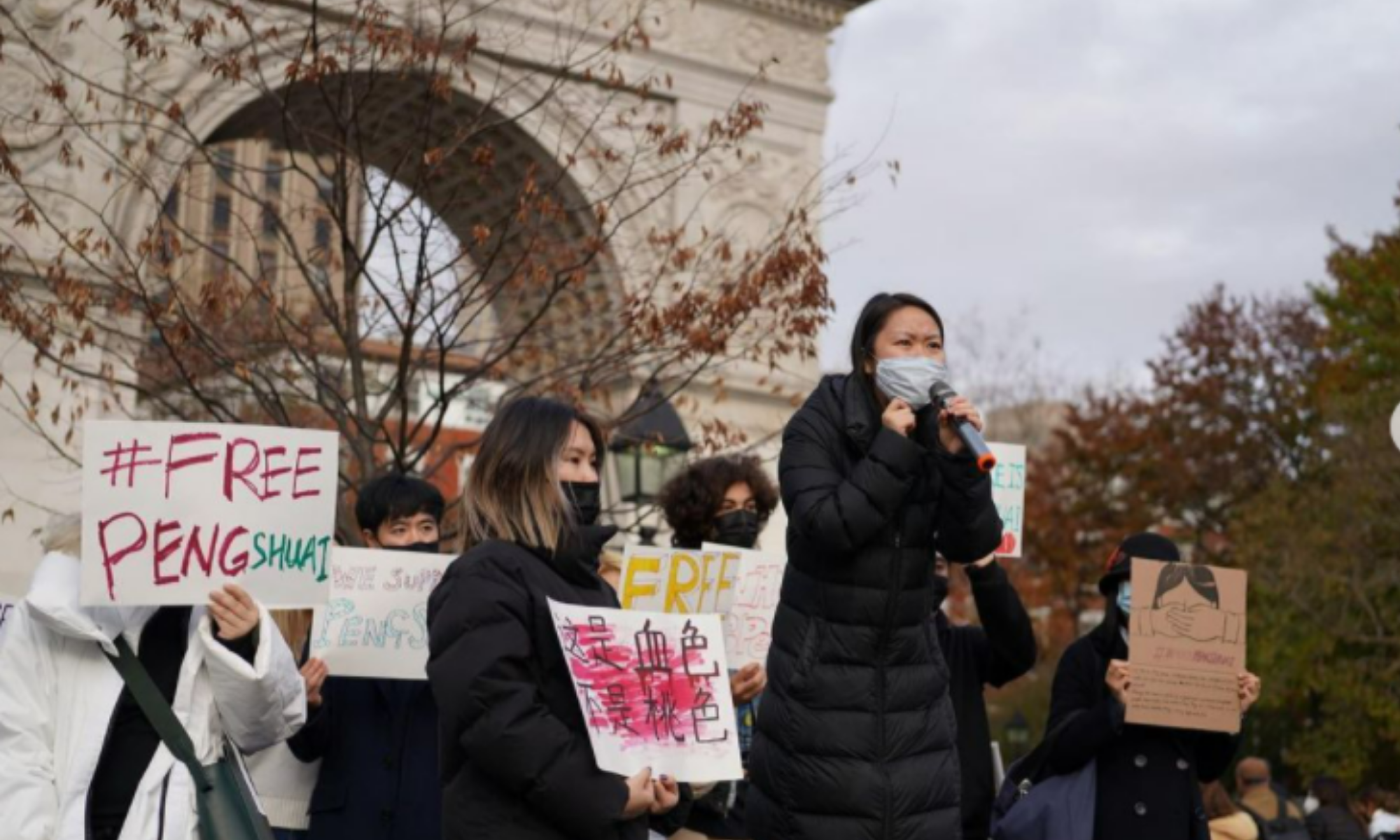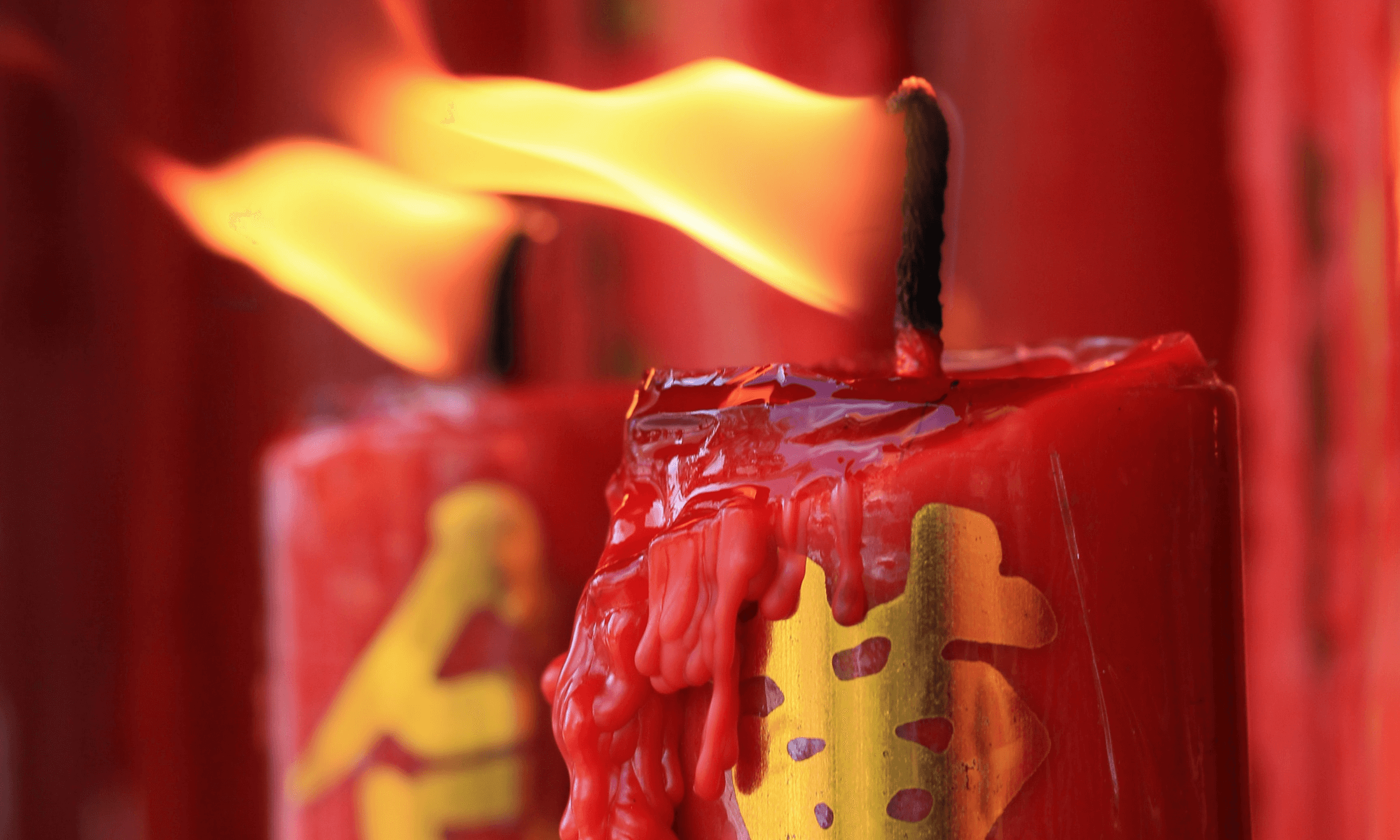
Feminist China
Facing censorship at home, Chinese feminists are sounding the alarm over Peng Shuai abroad
Amid crackdowns on #MeToo whistleblowers, Chinese feminists in the UK and US are creating communities to fight against sexism and racism.
Jessie Lau
01 Dec 2021
Standing in New York City’s leafy Washington Square Park, May* gazed around her at the many Chinese faces amid a crowd of protesters waving home-made banners chanting “free Peng Shuai” – and felt extremely moved. As a locally-based feminist activist in her 20s from China, she had helped plan the rally on Nov. 21 in support of Peng Shuai, a Chinese tennis star who mysteriously disappeared from public view after publishing an explosive (now-deleted) #MeToo post, accusing former vice-premier Zhang Gaoli of sexual assault on 2 November.
The political sensitivity of this high-profile case, the first #MeToo allegation to pierce the top ranks of China’s ruling Communist Party, meant organisers expected few Chinese people to risk turning up at a public demonstration. In recent years, Beijing has ramped up efforts to control dissent, creating an atmosphere of fear and self-censorship. Chinese citizens have been jailed for making politically sensitive comments while abroad. But at the height of the rally, the crowd swelled to nearly 40, with many staying behind at the end of the protest to build connections with one another.
“The (#MeToo) perpetrator is literally one of the most powerful people in China,” May of Feminist China, an international network of Chinese feminists, tells gal-dem. “Despite this, we still see this number of people show up, (being) willing to hold up a sign behind the speakers. That’s very inspiring. They give us the courage to speak louder.”
China’s #MeToo movement has gained momentum since it first took off in 2018, with a growing number of citizens – particularly young people – becoming more aware of gender issues, with some even becoming prepared to publicly challenge gendered harassment and violence. The nation has recently seen a slew of high-profile cases, such as a woman accusing pop star Kris Wu of date rape, an employee of tech giant Alibaba accusing her boss of sexual assault, and a college student accusing a tech billionaire of rape. The movement has also garnered some small victories over the past years, in a system where activists say the odds are stacked against women. Wu, the disgraced pop star, faced a rare arrest on suspicion of rape in August, amid a state crackdown on the excessive celebrity culture.
At the same time, the space for addressing gendered social issues in China has drastically diminished in recent years, with activists coming under intensifying scrutiny and censorship. Dozens of feminist social media accounts have been shuttered this year in a coordinated campaign to silence feminist voices. Two women have filed lawsuits against Chinese social media platform Weibo after the internet company removed their accounts, allegedly for posting “illegal and harmful” content. Those who express feminist views online have also been subjected to a torrent of nationalistic hate messages.
“The space for addressing gendered social issues in China has drastically diminished in recent years, with activists coming under intensifying scrutiny and censorship”
Some activists have been surveilled and even placed behind bars. Sophia Huang Xueqin, an award-winning journalist and one of China’s most well known #MeToo activists, was arrested on Sep. 19 with Wang Jianbing, a labour activist who helped women report sexual harassment. The two vanished a day before Huang was due to leave China to pursue a masters degree in gender studies at the University of Sussex, for which she received a Chevening Scholarship. Now, both have been officially detained under the charge of “incitement to subvert state power”.
Such developments have mobilised Chinese feminists overseas to strengthen efforts to amplify and support peers back home, through holding events like the New York Peng Shuai rally as well as building communities, both physical and virtual. These people act as a crucial bridge between China and the outside world, sharing information both ways and archiving material erased by Chinese censors.
“Since it is very difficult for Chinese (people) living in China to show their support, the rally demonstrates that Chinese women do care about Peng and are concerned about her well-being,” says Lijia Zhang, a feminist writer from China, now based in the United Kingdom. “This international support is significant.”
This global pressure can be a powerful tool for protecting victims like Peng and others. Actions like those taken by the Women’s Tennis Association – which threatened to cut lucrative tennis ties with China worths tens of millions of dollars, in addition to releasing timely statements demanding confirmation of Peng’s safety – go far to ensure her safety, says overseas feminist Jacky*, who uses a pseudonym due to security concerns.
“Since it is very difficult for Chinese (people) living in China to show their support, the rally demonstrates that Chinese women do care about Peng and are concerned about her well-being”
Lijia Zhang
A day after the rally, Peng reappeared into public view, in the form of a 30-minute video call with the president of the International Olympic Committee. Peng reportedly said she was “safe and well” but “would like to have her privacy respected at this time,” according to a statement by the organization, which has come under fire from human rights activists, who have accused it of being a vehicle for Chinese propaganda. State outlet Global Times editor Hu Xijin also published official photos and videos of Peng attending a tennis tournament in Beijing.
Hu had previously posted two videos of Peng on November 20 looking relaxed with others at a restaurant that appear clumsily staged: one with those present making unnatural comments emphasising the date, another in which the cameraman painstakingly zoomed into a sign showing the date on the door. Another state media reporter previously also tweeted jarring photos showing Peng playing with toys and a cat in her apartment that were allegedly shared by a friend and posted on Peng’s WeChat account.
“The target of these photos and videos are not people who are standing up for Peng Shuai, but people who are relatively neutral and support the government,” May said. “It provides evidence for them to attack [Peng’s supporters], exhaust us, and distract from the real issue of sexual assault.”
Jacky, a Chinese feminist studying in the United Kingdom, is now working with others to advocate for the release of activists Huang and Wang, who have now been detained for more than two months. She first met Huang while working in the NGO space in China, and the two became friends over the years.
“(Huang) Xueqin is an extremely hardworking and dedicated individual who never gives up trying to do the right thing. Why do they have to treat her this way?” Jacky said. The University of Sussex and Chevening must take further actions to ensure her safety, she added. “We have a responsibility to let people here know about her case.”
As well as coordinating rallies and campaigns to support feminists back home, overseas Chinese feminists working internationally also play a critical role in building safe spaces and a support system for Chinese citizens abroad, at a time when anti-Chinese sentiment and hate crime against East and Southeast Asians is reaching an all-time high across the world, amid the pandemic and deteriorating relations between Beijing and many Western governments.
“Overseas Chinese feminists working internationally also play a critical role in building safe spaces and a support system for Chinese citizens abroad”
In the United Kingdom, Chinese feminists facilitate mental health support workshops and information sessions on a variety of topics, such as how to grapple with sinophobias, and accessing healthcare services as a person of colour.
Most participants are young students, and not everyone who attends these events does so because they are feminists. But such activities present an opportunity for those who are curious to learn about issues from a feminist perspective, as well as build connections with peers struggling with similar challenges, activists say.
One Chinese academic based in the UK says such spaces have become a haven for Chinese students studying abroad, who are often stereotyped as “silent” or “shy” due to language and cultural barriers, resulting in them becoming cut off from the rest of the student body.
“It’s increasingly important for students to have this space as a sanctuary against anti-East and Southeast Asian discrimination,” the academic says. “This is against the background of international students being used as cash cows in British universities.”
In the West, anti-China rhetoric from conservative elements are increasingly co-opting gender issues in China to perpetuate racist notions of western exceptionalism and sexist ideology. For instance, during the Peng Shuai rally, a protester was told by a passerby that the US government would never “disappear” women like the Chinese state, and therefore do not have issues with sexism or are “better,” according to May.
Many also weaponise such discussions to attack overseas Chinese people or members of the Chinese diaspora who express dissenting political views, feeding into a vicious and exhausting cycle of abuse. “For people who are in between and trying to hold a critical view, you have to be very cautious. We get attacks from two, three sides,” May says.
Although there is a long legacy of feminist campaigning in China, the phenomenon of overseas Chinese feminist activism is relatively new. Lü Pin, a veteran Chinese feminist who has been based in the US since 2015, says there aren’t many feminists from China currently advocating overseas like herself.
Having worked on women’s issues for over two decades, she founded the organisation Feminist Voices in 2009. The group garnered over 180,000 followers on Weibo before being shut down by Chinese authorities in 2018 on International Women’s Day.
Moving forward, organisers of the rally for Peng Shuai plan to keep demanding for a full, independent investigation into her allegations, as well as her safety and freedom.
“Being a Chinese woman in the US, you’re racialised, sexualised and foreign. We’re dealing with a lot of issues happening here. But we care equally and deeply about issues in China,” May adds. “We will continue to hold space for our community to process.”
*names have been changed to protect identities









